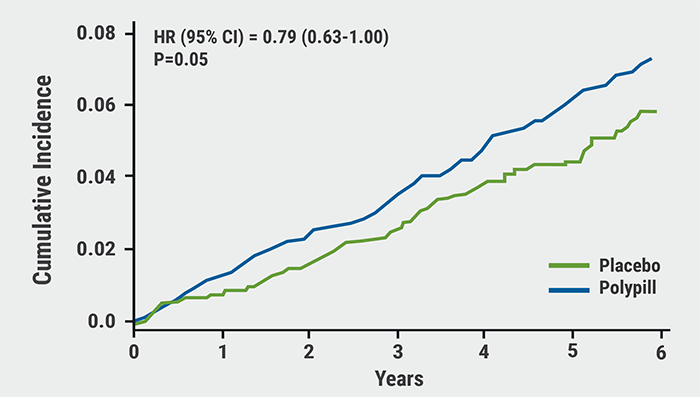Dr Neil Kelly (Weill Cornell University, USA) and colleagues analysed data from 20,417 participants of the REGARDS study. The mean age was 64.8 years, and 56% were women. The researchers evaluated the level of exposure to 4 healthy behaviours, degree of polypharmacy, and all-cause death rates. Adherence to 4 healthy behaviours was scored: a Mediterranean diet, physical activity, smoking abstinence, and sedentary lifestyle avoidance (low TV time). A Mediterranean diet emphasises fruits, legumes and vegetables, whole grains, fish oil, and olive oil, as well as moderation for dairy products and wine. Each behaviour was scored from 0 (low adherence) to 2 (high adherence). A cumulative Health Behavior Score (HBS) was based on the sum of individual behaviour scores (range 0–8). At baseline, 44% of participants used <5 medications (i.e. no polypharmacy), 39% used 5–9 medications (i.e. polypharmacy), and 17% used ≥10 medications (i.e. hyperpolypharmacy).
After a mean follow-up of 9.8 years, the primary endpoint of mortality increased with higher medication burden:
- no polypharmacy: 19.1%;
- polypharmacy: 29.7%;
- hyperpolypharmacy: 41.3%.
The highest score for each behaviour was inversely associated with all-cause mortality in all 3 medication groups. The highest HBS was associated with a substantial benefit in all groups compared with lowest HBS:
- no polypharmacy: HR 0.52 (95% CI 0.45–0.61);
- polypharmacy: HR 0.55 (95% CI 0.49–0.63);
- hyperpolypharmacy: HR 0.69 (95% CI 0.58–0.82).
“We have long known about the benefits of a healthy lifestyle,” Dr Kelly said. “The results from our study underscore the importance of each person’s ability to improve their health through lifestyle changes even if they are dealing with multiple health issues and taking multiple prescription medications.”
- Kelly N, et al. Healthy Lifestyle is Inversely Associated With All-Cause Mortality Irrespective of Medication Burden. P929, AHA Scientific Sessions 2020, 13–17 Nov.
Posted on
Previous Article
« Vitamin D or omega 3 fatty acids do not prevent AF Next Article
Remote risk management programme effective and efficient »
« Vitamin D or omega 3 fatty acids do not prevent AF Next Article
Remote risk management programme effective and efficient »
Table of Contents: AHA 2020
Featured articles
COVID-19 and Influenza
Fewer CV complications than expected in AHA COVID-19 Registry
Worse COVID-19 outcomes in younger obese patients
Effects of CVD in hospitalised COVID-19 patients
Unfavourable outcomes for COVID-19 patients with AF and atrial flutter
High-dose influenza vaccine in patients with CVD
Atrial Fibrillation
Vitamin D or omega 3 fatty acids do not prevent AF
Active screening for AF improves clinical outcomes
AF screening in older adults at primary care visits
CVD Risk Reduction
Clever trial design gets patients back on statins: the SAMSON trial
Polypill plus aspirin reduces cardiovascular events
Lowering LDL cholesterol in older patients is beneficial
No CV benefit from omega 3 in high-risk patients
Safety and efficacy of inclisiran for hypercholesterolemia
Remote risk management programme effective and efficient
Healthy lifestyle lowers mortality irrespective of medication burden
Heart Failure
Omecamtiv mecarbil improves outcomes in HFrEF-patients
IV iron reduces HF hospitalisation
Dapagliflozin reduces renal risk independent of CV disease status
“Strongly consider an SGLT2-inhibitor in most T2DM patients”
Additional HFrEF education and patient-engagement tools
Acute Coronary Syndrome
No benefit from omega-3 fatty acids after recent MI
PIONEER III trial: Drug-eluting stents comparable
Coronary and Valve Disease
Extra imaging reveals cause of MINOCA in women
Ticagrelor not superior to clopidogrel after elective PCI
Stroke
Ticagrelor/aspirin reduces stroke risk in patients with ipsilateral cervicocranial plaque
AF monitoring following cardiovascular surgery
Miscellaneous
PAD: Rivaroxaban reduces VTE risk after revascularisation
Sotatercept: potential new treatment option for PAH
Finerenone lowers CV events in diabetic CKD patients
Mavacamten effective in obstructive hypertrophic cardiomyopathy
Children exposed to tobacco smoke have worse heart function as adults
Transgender people have unaddressed heart disease risks
Intensive blood pressure lowering benefits older adults
Longer chest compression pause worsens outcomes after paediatric IHCA
Related Articles
February 17, 2021
High-dose influenza vaccine in patients with CVD

February 17, 2021
No CV benefit from omega 3 in high-risk patients

February 17, 2021
Polypill plus aspirin reduces cardiovascular events
© 2024 Medicom Medical Publishers. All rights reserved. Terms and Conditions | Privacy Policy
HEAD OFFICE
Laarderhoogtweg 25
1101 EB Amsterdam
The Netherlands
T: +31 85 4012 560
E: publishers@medicom-publishers.com

